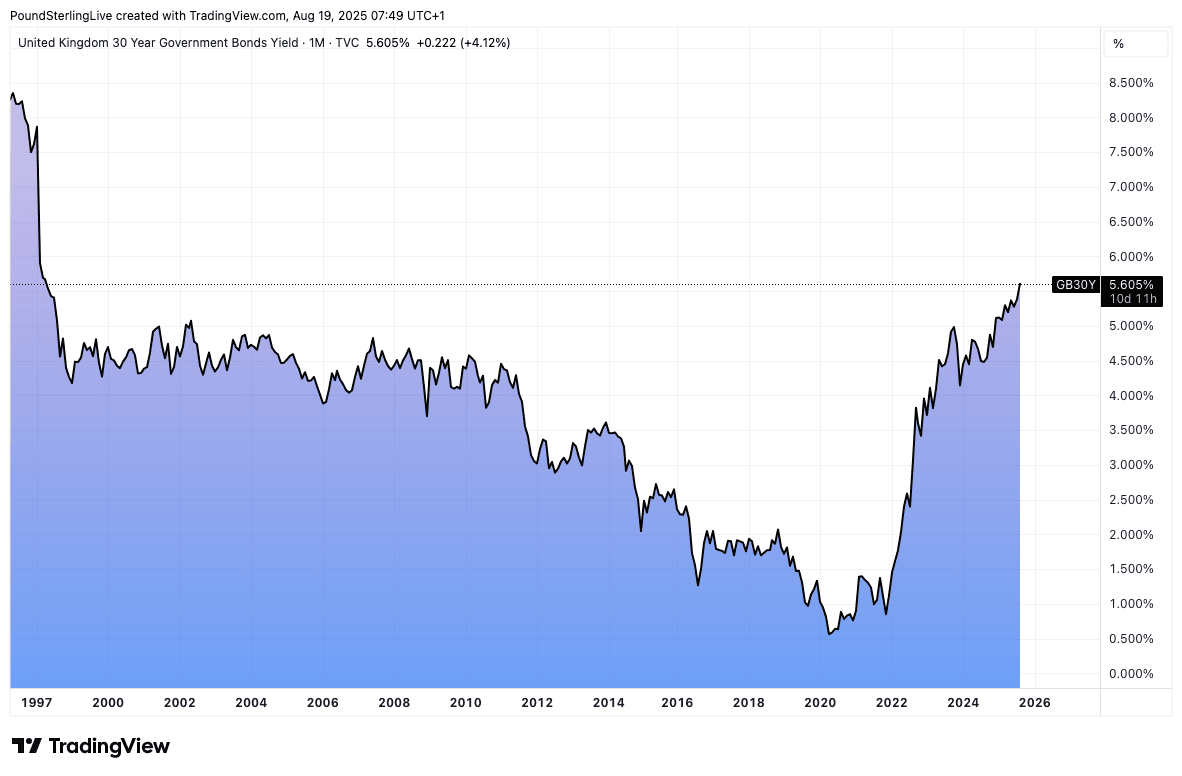
Image © Adobe Images
Analysts at Rabobank say "fiscal fog" is a headwind for Pound Sterling.
The Pound to Euro exchange rate (GBP/EUR) is projected to remain under pressure as markets focus on the UK's unsavoury debt dynamics.
"If the UK gilts market hits the headlines, it is usually a sign of bad news," says Jane Foley, Senior FX Strategist at Rabobank. A well-balanced gilts market tends to be a dull and boring one that steers away from the limelight. Unfortunately, there are a number of factors around inflation and (the lack of) welfare reform that have kept gilts relatively lively in recent months."
The cost of borrowing - measured by the interest rate paid to investors in UK government debt - is rising again.
We have seen all tenors of debt maturity rise, but it is the long-dated 30-year yield that is catching the headlines approaching levels last seen in 1997 at 5.606%. (When bonds selloff, the yield the offered rises, as the yield and the value are inversely related.)
"Jitters over inflation and public finances lift the 30-year UK government bond yield to levels last seen when Geri Halliwell walked away from the Spice Girls," reports the Times in its Tuesday edition.
Sky News also went for the music hook: "Just yesterday, the yield on the government's 30-year bonds - the best measure out there of the UK government's long-term cost of borrowing - closed at the highest level since 1998, not long after Oasis released the album Be Here Now."
"Today, gilts are back in the headlines again and inevitably comparisons have again been drawn between the level of long-term interest rates now and those that were hit after the September 2022 mini-budget under the Truss leadership. While circumstances behind the rise in yields in September 2022 are very different to today, there is a common factor given the high level of prevailing government debt in the UK," says Foley.
Usually, bonds and the Pound move inversely (bond price down = bond yield up = pound up). However, in periods of heightened anxiety over UK debt, the result is a selloff in both bonds and the Pound as yields surge.
These selloffs happened in 2022 when Liz Truss tried to pass her 'mini budget' and there have been brief episodes under Chancellor Rachel Reeves' leadership.
UK borrowing has risen sharply under the new Labour government which wants to boost investment while continue to fund Britain's generous social benefits schemes. To pay for it all, Chancellor Rachel Reeves is floating new ideas to boost the Treasury's tax intake, to ensure lenders retain their confidence in the UK debt markets.
Ideas like new property wealth taxes are being floated by the Treasury, as well as pension savings raids.

Above: UK 30-year bond yields are surging.
However, nothing has yet been proposed that will adequately cover the sizeable fiscal hole that is opening up.
"It is difficult to figure out exactly how she will balance the books in the Autumn budget given that Labour MPs have baulked at cutting welfare spending and in view of her own set of strict fiscal rules. The market is therefore likely to remain sensitive to fiscal matters in the UK," says Foley.
Rabobank sees the fiscal issue as a potentially negative factor for GBP in the run-up to Autumn's budget.
"Despite the support offered recently by better-than-expected UK GDP data and the fall in market expectations for another BoE rate cut this year. We continue to see scope for a grind back to EUR/GBP0.87 on a 1-to-3-month view," says Foley.
EUR/GBP at 0.87 gives a Pound into Euro cross rate of 1.15.
